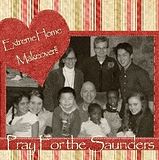Here is a book review that I have written about a book called As We Forgive.

AS WE FORGIVE
“The gash across the face of Emmanuel
Mahuro, a seventeen year old Rwandan native, is no longer a open wound. Today, like a jagged boundary line across map, a scar juts down the plateau of his
forehead, across the bridge of his nose, and up the slope of his right cheek. It is impossible to look into Emmanuel's eye's without seeing this deep cut, a mark of division etched across his face-and the face of Rwanda-fifteen years after the genocide.
My first reaction to such scars is to avert my eye's. But to look away from Emmanuel's scars is to look away from him. Strangely, as my eye's adjust to Emmanuel's face, there is an impulse, not to recoil, but to follow the line of the scar across his skin.
Emmanuel’s scar testifies to two realities. It is a witness to the human capacity for evil. To look at it is to hear it scream the brutality of an April that aches in the memory of an entire people. Yet his scar testifies to another truth: the stunning capacity of humans to heal from the unthinkable. To trace that scar is to discover the hope of a people who, despite losing everything, are finding a way to forge a common future for Rwanda.
Rwanda’s wounds, like Emmanuel’s, are agonizingly deep.Today, they are being opened afresh as tens of thousands of killers are released from prison to return to the hills where they hunted down and killed former neighbors, friends, and classmates. In the everyday business of life-purchasing corrugated metal for roofing, burying bananas in the ground to make
urwagwa, and hauling harvested sorghum to the market-survivors commonly meet the eyes of people who shattered their former lives. How can they live together? This is not a philosophical question, but a practical one that confronts the Rwandans daily.”
Prelude, From AS WE FORGIVE
As We Forgive was written by Catherine Claire Larson and inspired by the award winning film also called As We Forgive. This book goes through stories of people who have survived the Rwanda genocide. The killing of
Tutsi's in Rwanda began after the assassination of
President Juvenal
Habyarimana.
President Juvenal
Habyarimana's plane was shot down near Kigali International Airport on April 6, 1994. Over the course of approximately 100 days, from the assassination of
Juvenal Habyarimana on April 6, up until mid July, at least 500,000 people were killed. Most estimates indicate a
death toll between 800,000 and 1,000,000, which could be as high as 20% of the total Rwanda population.
AS WE FORGIVE tells the story of only a handful of people from the thousands of stories just waiting to be told. It tells not only about the victims and
their struggles but also about the killers and how each one had to overcome and find forgiveness in God. This story tells about the victims
struggle to forgive people who had
destroyed their lives and everything they hold dear. And of the killers
struggle to face the victims and confess.
“I FORGIVE YOU,” said
Rosaria softly. “if you have sincerely confessed your sin before God and truly changed, then I forgive you.”
Saveri searched for words, opened his mouth to speak them, but none came, only tears of relief.
“How can I
refuse's to forgive you when I did not make you?” Your crime”-she paused, forming her thoughts carefully-“your crime was
against God, who created the people you killed.”
Saveri had been prepared for many things, but not this. He had been at the
meetings as other victims vented their
rage against the killers at their
confessions. He had even seen some leave and
refuse to return after meeting the ones who had harmed their families. Believing that even death was not an adequate punishment for his wrongs,
Saveri had braced
himself for retribution, insults, anger, even silence, but not this.
“Thank you,” he stammered, wondering if he had truly heard her right or was in some strange kind of dream. “I don’t deserve this. I’m so sorry. Thank you.”
Ripening, From AS WE FORGIVE
Forgiveness is possible, as the touching scene you just read shows. Forgiveness is something we all need and can only give with God's strength. This book also shows us that healing is
possible even after the
unimaginable.
Why would I do a book report about the Rwandan
genocide?
Because even though I don't live in Rwanda the stories from the Rwandan genocide deserve to be heard. The events that happened
there are heart
wrenching and it is easy to turn our eyes away from it. Through the Rwandan
genocide we have seen how evil and hatred filled
people can be. But we have also seen the power of forgiveness, forgiveness of others and forgiveness of ones self.
Why should you read this book?
This book shows how God is moving in Rwanda. Victims and killers finding forgiveness together and are learning to live once again with each other. A country ravaged by a blood thirsty slaughter slowly finding peace and love. This book shows the power of Forgiveness and Healing like no other. Each story will bring tears to your eyes as your read these people's defeats; but most
importantly their Victories.




















































